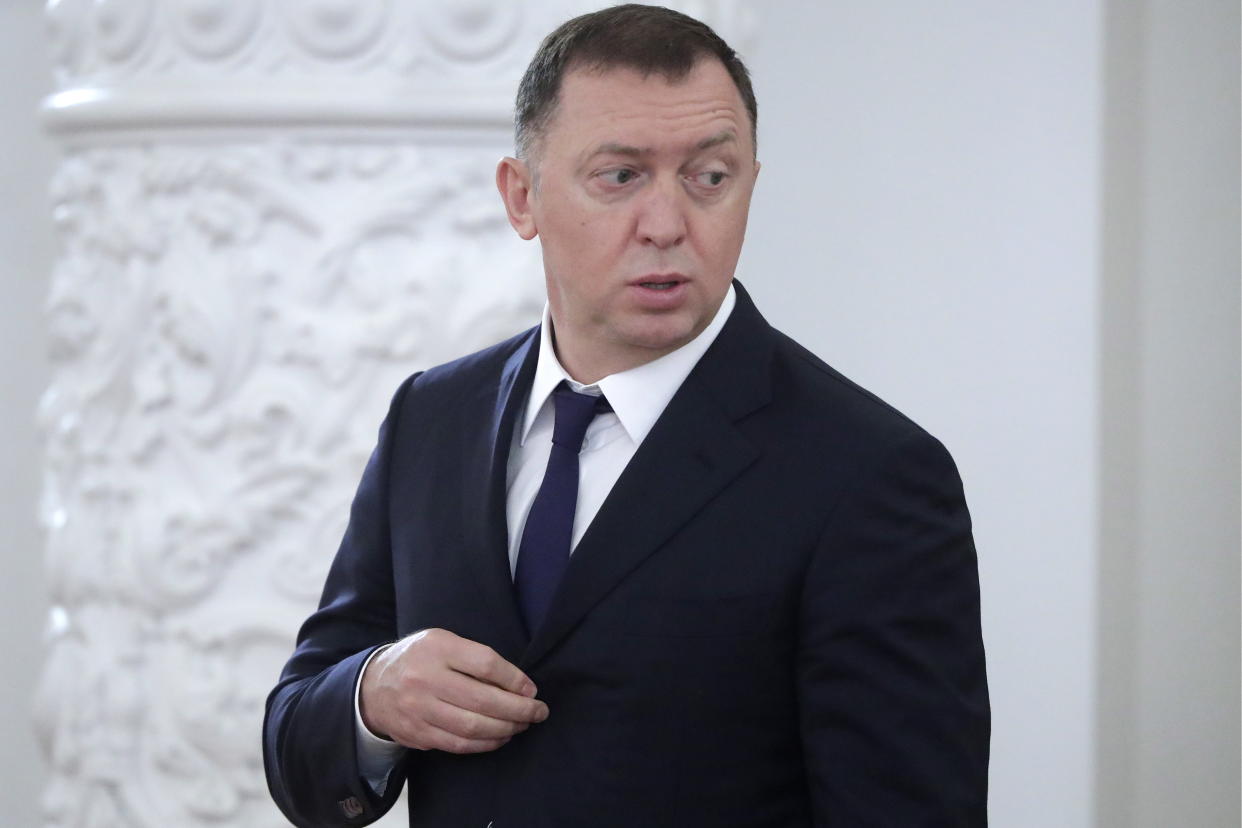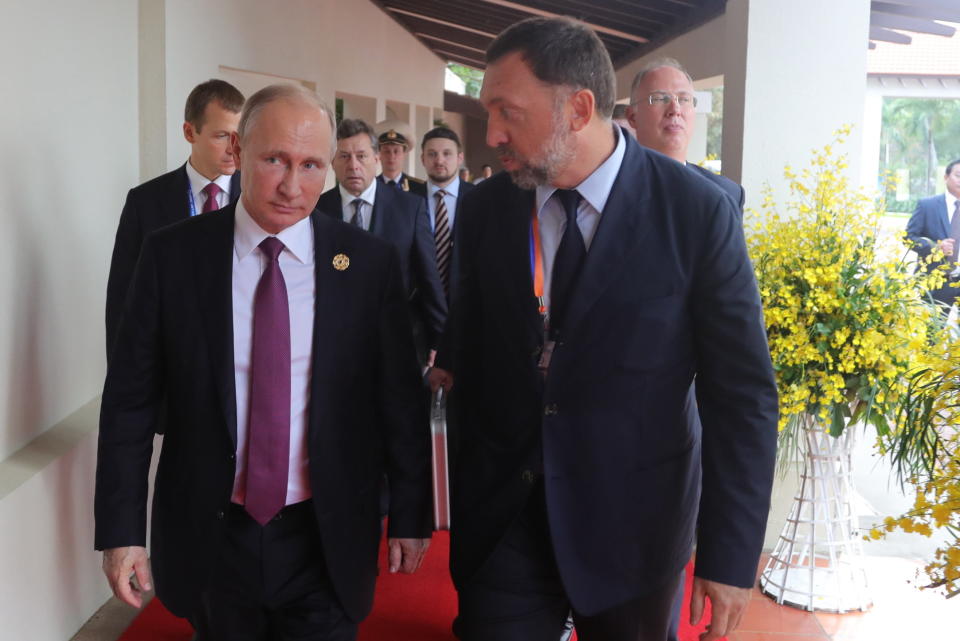Hedge funds and banks prodded Trump administration to lift sanctions on Russian oligarch

In a surprise move, the Treasury Department on Dec. 19 informed Congress it would lift sanctions on three companies owned by Oleg Deripaska, a powerful Russian oligarch who controls much of the world’s aluminum output.
It was a stunning reversal of fortune for Deripaska, who has had difficulty entering the United States, reportedly because of his alleged ties to Russian organized crime. Deripaska has denied he has such ties.
While the move to lift sanctions comes amid an investigation of Russian interference in the 2016 presidential election, Western hedge funds and major financial institutions were key advocates in getting the business sanctions lifted, according to three sources with direct knowledge of Deripaska’s businesses — two who previously worked for him and one who worked for a hedge fund where he had close ties.
“Other than his paid help, they [the hedge funds and financial institutions] were his only important advocates,” one of the sources said.
The business sanctions had been imposed just last April and hit three companies: Deripaska’s holding company, EN+, which had an IPO in November 2017 in London that raised $1.5 billion; Rusal, a large Moscow-headquartered aluminum company EN+ controls, which according to the Treasury statement produces 7 percent of global aluminum output; and JSC EuroSibEnergo, Russia’s “largest independent power company,” according to its LinkedIn page. After the sanctions were announced, Rusal’s share price dropped more than 50 percent, and the ruble also fell.
In its April declaration, Treasury’s Office of Foreign Asset Controls had designated Deripaska, six other oligarchs and 17 senior government officials as pro-Putin elites who further the Kremlin’s global malign activities, including its attempts “to subvert Western democracy.”
In announcing it would lift the sanctions against Deripaska’s companies, the Treasury Department said it had originally sanctioned these companies “because of their ownership and control by sanctioned Russian oligarch Oleg Deripaska, not for the conduct of the companies themselves. These companies have committed to significantly diminish Deripaska’s ownership and sever his control.”
While Deripaska was forced to give up direct control of his firms, he remains far and away the single biggest shareholder, Bloomberg reported. “Longstanding allies hold many of the remaining shares,” the news agency said.
The three sources said that Deripaska is close to numerous Western hedge funds, has investments in some of those and regularly meets with their representatives, either abroad or when he is allowed to enter the United States. It is impossible to know which funds he invests in, however, because laws do not require them to list their investors.
“Aluminum trades on news, the price spikes and tanks,” one of the sources said. “It’s a commodity, and hedge funds are heavily invested. That’s why they like to talk to Deripaska. He knows about shipping news, developments in the Chinese market, what his competitors are doing. Even his own production numbers are extremely valuable and help hedge funds make a lot of money.”
Rusal did not reply to emailed requests for comment. Messages sent to email addresses associated with Deripaska were not returned.
The sources said that when EN+ held its IPO in late 2017, it was well known that Treasury might hit Deripaska’s companies with sanctions, but investors bought in anyway. “A lot of people thought it was incredibly irresponsible,” one of the sources said. “It was like the hedge funds and banks were daring Treasury to screw them out of the money. The sanctions came, and now the investors are getting bailed out.”

Back in October 2017, a month before the IPO, Political Alpha, a Washington-based political and business intelligence firm that worked for Mason Capital Management, a New York hedge fund, wrote a note to it and other hedge fund clients saying that the U.S. government “could be preparing a package of sanctions” against Deripaska’s firms.
“The reason you know Deripaska’s name is that Paul Manafort used to work and lobby for him,” said the note, which was obtained by Yahoo News. “He is banned from travel to the U.S. … [and] is scummy as the day is long, but has nevertheless managed to evade sanctions. Perplexingly, a lot of people like him because he’s a ‘philanthropist.’ But you can ask Harvey Weinstein how quickly a person’s PR can roll over.”
The note added, “We want to stress that we don’t know the timing on any potential initiation of sanctions, but we are confident the government is pulling a package together for that purpose. This just smells right. We want you to be prepared for the implications, should the moment come.”
Mason Capital Management soon terminated its relationship with Political Alpha. In April 2018, the U.S. government moved to impose sanctions on Deripaska and his business empire.“
A spokesman for Political Alpha declined to comment. “We have a policy not to discuss clients, client contracts or the research we provide them with the media,” a spokesperson for the firm wrote in an email.
Michael Martino, who identified himself as the founder of Mason Capital Management, said he had not advocated for Deripaska and that he had only met the oligarch once, “well before 2017.” He said he was not familiar with Political Alpha and didn’t know about it having worked for Mason Capital or being dismissed. “We hire consultants and stop using them all the time,” he said.
A Mason Capital Management spokesman told Yahoo News “the firm, nor any of its principals, has ever had any relationship with, or investments from, Deripaska or any of his affiliates. Nor has Mason invested in Deripaska’s companies.”
Nor had anyone associated with Mason lobbied to lift sanctions on Deripaska, the spokesman added.
In his effort to remove sanctions on his companies, Deripaska has deployed a number of top Washington and London advocates. These include Lord Barker of Battle, a protégé of former British prime minister David Cameron and the chairman of EN+. He retained Mercury Public Affairs of Washington, which was paid $108,000 per month, according to the New York Times.
No one answered at EN+’s London office on Monday, and its website offers no media contact information.
The December decision to lift sanctions on Deripaska’s firms was unexpected because they’d been imposed so recently, and with such harsh accusations made against him. The move came not long after news reports that Deripaska is an asset of the CIA or FBI, or both.
The sources with knowledge of his hedge funds disputed that his relationship with U.S. intelligence agencies played an important role. “If he was such a close friend of the FBI and CIA, he wouldn’t still be blocked from coming here,” said one of the sources, who previously worked for Deripaska.
Even with sanctions lifted against his businesses, it appears Deripaska still has had trouble obtaining visas to visit the United States except under special circumstances. Deripaska’s visa was revoked in 2007, but he was later allowed to come to the United States to meet with hedge funds and other businesses, such as Morgan Stanley and Goldman Sachs. The State Department also approved Deripaska’s visits on a diplomatic passport in 2015 and 2016 to assist the FBI with ongoing investigations, according to the New York Times report on the attempt to turn him.
It is unclear what current U.S. travel restrictions are on Deripaska. In response to questions from Yahoo News, a State Department spokesperson said it could not respond because of the government shutdown. “Communications with the media will be limited to events and issues involving the safety of human life or the protection of property, or those determined to be essential to national security,” the spokesperson wrote.
Deripaska has long spread money around Washington, hiring lobbyists and media relations specialists, and even donating to major think tanks in the hopes of winning favor and enabling him to travel to the United States.
The Mercury campaign on Deripaska’s behalf was led by Bryan Lanza, a former Trump campaign and transition aide. “I never dealt with Oleg directly or indirectly,” he said during a phone interview. “I worked with Lord Barker on his plan. I don’t recall hearing about hedge funds advocating for him, but I was singularly focused on the Barker Plan.”
The “Barker Plan” called for a lifting of sanctions if Deripaska reduced his stake in EN+, his holding company, to below 50 percent and ceded management of EN+ and Rusal. Those are exactly the conditions that preceded Treasury’s recent decision.
Lanza said he contacted Treasury, Commerce and the White House.
In response to questions, a Treasury Department spokesperson sent to Yahoo News the notification to Congress and the press release on its decision to end sanctions. The sanctions are set to be lifted 30 days after the Dec. 19 notification, unless Congress moves to block the decision.
People familiar with Deripaska say with sanctions lifted on his businesses, he will step up his campaign to be allowed to travel freely to the United States
Updated [6:08 pm, Dec. 26, 2018]: This story has been updated based on comments from Mason Capital Management.
_____
Read more from Yahoo News:


